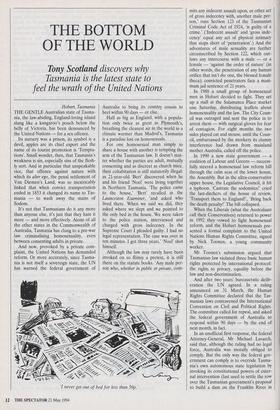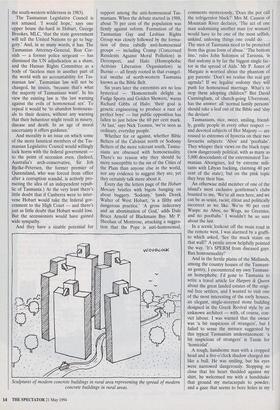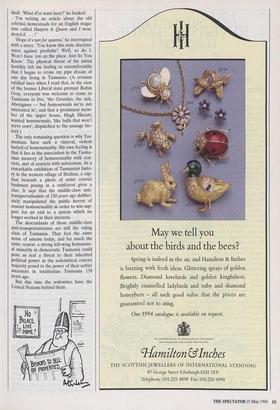THE BOTTOM OF THE WORLD
Tony Scotland discovers why
Tasmania is the latest state to feel the wrath of the United Nations
Hobart, Tasmania THE GENTLE Australian state of Tasma- nia, the law-abiding, England-loving island slung like a kangaroo's pouch below the belly of Victoria, has been denounced by the United Nations — for a sex offence.
Its nursery was a prison, its symbol is a devil, apples are its chief export and the name of its tourist promotion is 'Tempta- tions'. Small wonder, then, that Tasmania's weakness is sin, especially sins of the flesh- ly sort. And in particular that unspeakable vice, that offence against nature with which its alter ego, the penal settlement of Van Diemen's Land, was so inextricably linked that when convict transportation ended in 1853 it changed its name to Tas- mania — to wash away the stains of Sodom.
It's not that Tasmanians do it any more than anyone else, it's just that they hate it more — and more effectively. Alone of all the other states in the Commonwealth of Australia, Tasmania has clung to a pre-war law criminalising homosexuality, even between consenting adults in private.
And now, provoked by a private com- plaint, the United Nations has demanded reform. Or more accurately, since Tasma- nia is not itself a sovereign state, the UN has warned the federal government of Australia to bring its country cousin to heel within 90 days — or else.
Half as big as England, with a popula- tion only twice as great as Plymouth's, breathing the cleanest air in the world in a climate warmer than Madrid's, Tasmania is a paradise lost on homosexuals.
For one homosexual man simply to share a house with another is tempting the arm of the Tasmanian law. It doesn't mat- ter whether the parties are adult, mutually consenting and as discreet as church mice, their cohabitation is still statutorily illegal: as 21-year-old 'Bert' discovered when he and his friend 'Noel' were living together in Northern Tasmania. The police came to the house,' Bert' recalled in the Launceston Examiner, 'and asked who lived there. When we said we did, they asked where we slept and we pointed to the only bed in the house. We were taken to the police station, interviewed and charged with gross indecency. In the Supreme Court I pleaded guilty. I had no legal representation. The case was over in ten minutes. I got three years.' Noel' shot himself.
Although the law may rarely have been invoked on so flimsy a pretext, it is still there on the statute books. 'Any male per- son who, whether in public or private, corn- 'I never get out of bed for less than 50p.' mits any indecent assault upon, or other act of gross indecency with, another male per- son,' runs Section 123 of the Tasmanian Criminal Code Act of 1924, 'is guilty of a crime.' ('Indecent assault' and `gross inde- cency' equal any act of physical intimacy that stops short of 'penetration'.) And the adventures of male sexuality are further circumscribed by Section 122, which out- laws any intercourse with a male — or a female — 'against the order of nature' (in other words, the penetration of any human orifice that isn't the one, the blessed female theca); convicted penetrators face a maxi- mum jail sentence of 21 years.
In 1988 a small group of homosexual men in Hobart decided to fight. They set up a stall at the Salamanca Place market one Saturday, distributing leaflets about homosexuality and the law. The City Coun- cil was outraged and sent the police in to arrest them — with surgical gloves for fear of contagion. For eight months the two sides played cat and mouse, until the Coun- cil, embarrassed by the mockery its clumsy interference had drawn from mainland mother Australia, called off the police.
In 1990 a new state government — a coalition of Labour and Greens — success- fully steered a homosexual law reform bill through the calm seas of the lower house, the Assembly. But in the ultra-conservative upper house, the Legislative Council, it hit a typhoon. 'Castrate the sodomites!' cried the last-ditchers of the house of review, 'Transport them to England!', 'Bring back the death penalty!' The bill collapsed.
When the Liberals (what the Australians call their Conservatives) returned to power in 1992 they vowed to fight homosexual reform, and the Hobart homosexuals pre- sented a formal complaint to the United Nations Human Rights Committee, signed by Nick Toonen, a young community worker.
Mr Toonen's submission argued that Tasmanian law violated three basic human rights protected by international protocol: the rights to privacy, equality before the law and non-discrimination.
And after two years' bureaucratic delib- eration the UN agreed. In a ruling announced on 31 March, the Human Rights Committee declared that the Tas- manian laws contravened the International Convention on Civil and Political Rights. The committee called for repeal, and asked the federal government of Australia to respond within 90 days — by the end of next month, in fact.
In an unofficial first response, the federal Attorney-General, Mr Michael Lavarch, said that, although the ruling had no legal force, Australia was morally obliged to comply. But the only way the federal gov- ernment can comply is to override Tasma- nia's own autonomous state legislation by invoking its constitutional powers of exter- nal intervention (last used to settle the row over the Tasmanian government's proposal to build a dam on the Franklin River in the south-western wilderness in 1983).
The Tasmanian Legislative Council is not amused. 'I would hope,' says one upper house die-hard in Hobart, George Brookes, MLC, 'that the state government will tell the United Nations to go to bug- gery.' And, in so many words, it has. The Tasmanian Attorney-General, Ron Cor- nish — a former police sergeant — has dismissed the UN adjudication as a sham, and the Human Rights Committee as a body of 'faceless men in another part of the world with no accountability for Tas- manian law'. Tasmanian law will not be changed, he insists, 'because that's what the majority of Tasmanians want'. In his view the existing law is 'the last warning against the evils of homosexual sex'. To repeal it would be 'to abandon homosexu- als to their desires, without any warning that their behaviour might result in misery, disease and death. In an age of moral uncertainty it offers guidance.'
And morality is an issue on which some of the more fanatical members of the Tas- manian Legislative Council would willingly lock horns with the federal government — to the point of secession even. (Indeed, Australia's arch-conservative, Sir Joh Bjelke-Petersen, the former premier of Queensland, who was forced from office after a corruption scandal, is actively pro- moting the idea of an independent repub- lic of Tasmania.) At the very least there's little doubt that if Canberra were to inter- vene Hobart would take the federal gov- ernment to the High Court — and there's just as little doubt that Hobart would lose. But the secessionists would have gained wide sympathy.
And they have a sizable potential for support among the anti-homosexual Tas- manians. When the debate started in 1988, about 70 per cent of the population was firmly against reform. Formation of the Tasmanian Gay and Lesbian Rights Group was closely followed by the forma- tion of three rabidly anti-homosexual groups — including Cramp (Concerned Residents Against Moral Pollution) in Devonport, and Halo (Homophobic Activists Liberation Organisation) in Burnie — all firmly rooted in that evangel- ical swathe of north-western Tasmania known as the Bible Belt.
Six years later the extremists are no less hysterical — 'Homosexuals delight in Fudge Sports and Golden Showers,' warns Richard Gibbs of Halo; 'their goal is genetic engineering to produce a race of perfect boys' — but public opposition has fallen to just below the 60 per cent mark. 'At last,' says Nick Toonen, 'we're seen as ordinary, everyday people.'
Whether for or against, whether Bible Belters of the Calvinist north or Sodomy Belters of the more tolerant south, Tasma- nians are obsessed with homosexuality. There's no reason why they should be more susceptible to the sin of the Cities of the Plain than anyone else in the world, nor any evidence to suggest they are, yet they certainly talk more about it.
Every day the letters page of the Hobart Mercury bristles with bigots banging on about buggery. 'Sodomy,' bawls Derek Walter of West Hobart, 'is a filthy and dangerous practice.' A gross indecency and an abomination of God,' adds Dale Bruce Arnold of Blackmans Bay. Mr P. Sheehan of Montrose, attacking a sugges- tion that the Pope is anti-homosexual, Sculptures of modern concrete buildings in rural area representing the spread of modern concrete buildings in rural areas. comments mysteriously, 'Does the pot call the refrigerator black?' Mrs M. Causon of Mountain River declares, 'The act of one man sodomising another man (or woman) would have to be one of the most selfish, unkind, unloving things one could do . . . The men of Tasmania need to be protected from this gross form of abuse.' The bottom line,' rules John Solomon of Taroona, 'is that sodomy is by far the biggest single fac- tor in the spread of Aids.' Mr P. Jones of Margate is worried about the phantom of gay parents: 'Don't we realise the real gay agenda? If we legalise sodomy they will push for homosexual marriage. What's to stop them adopting children?' But David Cunningham, of church-going Ulverstone, has the answer: all 'normal family persons' should take a leaf out of the Bible and `slay the deviant'.
Tasmanians, nice, sweet, smiling, friend- ly, gentle people in every other respect — and devoted subjects of Her Majesty — are roused to extremes of hysteria on their two favourite subjects: `Abos' and `pooftahs'. They whisper their views on the black topic (now dangerously political, with as many as 5,000 descendants of the exterminated Tas- manian Aborigines, led by extreme mili- tants with Libyan backing, claiming 40 per cent of the state); but on the pink topic they bray their bias.
An otherwise mild member of one of the island's most exclusive gentleman's clubs boasted to me, 'We're all men here, and we can be as sexist, racist, elitist and politically incorrect as we like. We're 90 per cent Wasps: no Abos, no Wogs, no Greenies, and no pooftahs.' I wouldn't be so sure about the last.
In a scenic lookout off the main road in the remote west, I was alarmed by a graffi- to which asked, 'See the muck stains on that wall?' A penile arrow helpfully pointed the way. 'It's SPERM from diseased gays. Ban homosexuality!'
And in the fertile plains of the Midlands, among the country houses of the Tasmani- an gentry, I encountered my own Tasmani- an homophobe. I'd gone to Tasmania to write a travel article for Harpers & Queen about the great landed estates of the origi- nal free settlers, and I wanted to visit one of the most interesting of the early houses, an elegant, single-storeyed stone building designed in the Greek Revival style by an unknown architect — with, of course, con- vict labour. I was warned that the owner was 'a bit suspicious of strangers', but I failed to sense the menace suggested by this typical Tasmanian understatement: 'a bit suspicious of strangers' is Tassie for 'homicidal'.
A tough, handsome man with a cropped head and a five-o'clock shadow charged me like a bull. He was smiling, but his eyes were narrowed dangerously. Stopping so close that his heart thudded against my shirt, he welcomed me with a handshake that ground my metacarpals to powder, and a gaze that seems to bore holes in my skull. 'What d'ye want here?' he barked.
`I'm writing an article about the old colonial homesteads for an English maga- zine called Flamers & Queen and I won- dered if . . . ? '
'Hope it's not for queens,' he interrupted with a sneer. 'You know this state discrimi- nates against pooftahs? Well, so do I. Won't have 'em on the place. Just So You Know.' The physical threat of his initial hostility left me feeling so uncomfortable that I began to revise my pipe dream of one day living in Tasmania. (A revision ratified later when I read that, in the view of the former Liberal state premier Robin Gray, everyone was welcome to come to Tasmania to live, 'the Greenies, the sick, Aborigines — but homosexuals we're not interested in'; and that a prominent mem- ber of the upper house, Hugh Hiscutt, wanted homosexuals, 'like bulls that won't serve cows', dispatched to the sausage fac- tory.) The only remaining question is why Tas- manians have such a visceral, violent hatred of homosexuality. My own feeling is that it lies in the association in the Tasma- nian memory of homosexuality with con- victs, and of convicts with subversion. At a remarkable exhibition of Tasmanian histo- rY in the western village of Strahan, a cap- tion beneath a photo of some convict bushmen posing in a rainforest gives a clue. It says that the middle-class anti- transportationists of 150 years ago deliber- ately manipulated the public horror of convict homosexuality in order to win sup- port for an end to a system which no longer worked in their interests.
The descendants of those middle-class anti-transportationists are still the ruling class of Tasmania. They feel the same sense of unease today, and for much the same reason: a strong left-wing homosexu- al minority in democratic Tasmania could pose as real a threat to their inherited Political power as the sodomitical convict majority posed to the power of their settler ancestors in totalitarian Tasmania 150 Years ago.
But this time the sodomites have the United Nations behind them.






































































 Previous page
Previous page